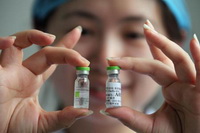China Intensifies Its Fight against H1N1 Virus
China takes measures against the A/H1N1 flu virus. Vice Premier Li Keqiang inspected the National Institute for the Control of Pharmaceutical and Biological Products here on Monday, which further highlighted the government's resolve to carry on the influenza vaccination campaign amid the growing infections.

As of 3 p.m. Monday, 30 people on the Chinese mainland had died of the flu among nearly 60,000 confirmed cases, figures from the Ministry of Health showed.
And the virus has claimed more than 6,000 lives across the world as of Nov. 1, according to the World Health Organization.
China raised the nationwide alert and began to take preventive actions to curb the influenza epidemic several months ago, but its recently promoted vaccination program grasped more social attention.
Now, the vaccination has been in its full swing, especially since Premier Wen Jiabao called on, during his inspection visit to the Beijing Children's Hospital on Oct. 31, an energetic effort in fight against the virus by "encouraging the inoculation, but on a voluntary basis," Xinhua reports.
It was also reported, Vice Premier Li Keqiang made the remarks when visiting the Beijing-based National Institute for the Control of Pharmaceutical and Biological Products, where the country's self-developed vaccines against the A/H1N1 flu are tested.
"Safety and quality are of top priority," Li said, adding that the inoculation of the A/H1N1 vaccines should always be conducted on an "informed, voluntary, and free" basis.
Li noted that autumns and winters were high-occurrence seasons for the flu, and urged the authorities to improve disease prevention and treatment in order to stop the disease from fast spreading across the country.
Authorities should focus on disease prevention in key venues and areas, especially schools, and make active efforts to prevent and deal with mass infection of the disease, Li said, Xinhua reports.
Meanwhile, in U.S. the Centers for Disease Control and Prevention said there are 38 million doses of H1N1 vaccine available, far short of the 159 million needed to cover people who fall into the highest risk groups, such as pregnant women and children.
Bruce Gellin, director for the National Vaccine Program office at the U.S. Department of Health and Human Services, called the situation "frustrating" for both patients and local health departments trying to make and keep distribution plans.
"We know the vaccine is safe and effective and we wish we had more of it now," said Gellin. "There is more coming, but it's not coming as quickly as we would like."
WHO is receiving donations from manufacturers, and some richer countries, including the United States, have pledged donations as well. But U.S. Health Secretary Kathleen Sebelius said last week that donations will be put off until at-risk Americans have all had the opportunity to get the vaccine, NewsHour reports.
Subscribe to Pravda.Ru Telegram channel, Facebook, RSS!





